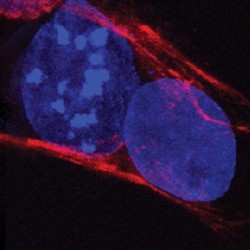By Helen Figueira
September 2, 2013
Time to read: 3 minutes
 Catching up with Dr Francesco Piccolo
Catching up with Dr Francesco Piccolo
“I’m out!” the fearsome words that have crushed the dreams of many an aspiring entrepreneur on the popular television programme Dragons’ Den. However, where there is failure in the Den there is also success. The CSC decided to mimic the popular TV show format to instigate bids for MRC Centenary Awards. A total of £11.1 million has been distributed to MRC Units, Centres and Universities along with 2.75 million for individual awards to support excellence in research. The CSC awarded £266,000 to 9 applicants, who succeeded in winning over a scientific panel – a member of the Scientific Advisory Board, a Group Head and the Institute Director – with their research ideas. One of the successful candidates was Dr Francesco Piccolo, who was awarded a grant for 9 months to complete and extend his research into the effects of Ten-Eleven translocation (Tet) proteins on DNA methylation in germline cells.
As an organism ages, harmful methylation accrues across the genome in response to environmental factors in the cell microenvironment. As cells age, the way their DNA is expressed alters due to changes in their epigenome. These harmful markers are routinely removed in the germline minimising the possibility of transmitting harmful changes to subsequent generations. How this happens isn’t fully understood, but Francesco knows from previous research that Tet proteins play an important role in wiping the ‘epigenetic slate’ clean in germline cells.
“Methyl marks on DNA are usually erased or reset as germ cells develop,” explains Francesco. “Studying this in vivo is challenging because the number of cells is limited.” His award supported collaborative research with the Jaenisch group in Boston, who generated an in vivo model, a Tet1 knockout mouse. Their research (published in Molecular cell) shows that Tet1 and Tet2 proteins play different roles in reprogramming germline cells.
Francesco continued his study of Tet proteins, shaping opinion around the mechanism by which silent methylated genes are activated (and demethylated) during reprogramming. Reprogramming is when a differentiated body (somatic) cell can be reverted back towards pluripotency (a stem-cell like state). This led to a publication in Cell and an invitation to review the subject for Trends in Cell Biology, currently in press.
“The centenary award supplemented my basic salary and afforded me with the chance visit international labs,” enthused Francesco. “It helped me finish my PhD and led to a Postdoctoral post at Rockefeller University in New York under Nathaniel Heintz, a world leader in this research. Without the award this simply wouldn’t have been possible.”
Other successful applicants have since been offered opportunities from prestigious universities and additional funding from other national institutes and schemes. Future plans to support a similar scheme where funding is partitioned on an annual basis are being made.
MT
Reference: Piccolo et al. 2013, Cell Press. Different Roles for Tet1 and Tet2 Proteins in Reprogramming-Mediated Erasure of Imprints Induced by EGC Fusion. doi:10.1016/j.molcel.2013.01.032